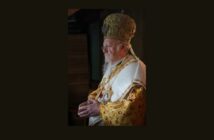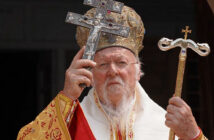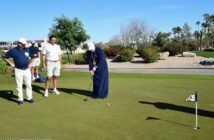Source: The National Herald
by TNH staff
CONSTANTINOPLE – Illustrating that Constantinople is still a “Byzantine” place regardless of what Turks call it, Ecumenical Patriarch Bartholomew said during an interview with the Turkish Daily Milliyet that he only learned from newspapers that a special commission was set up to decide the fate of the Halki Seminary, which has been closed for more than four decades.
“There is no representative of the Patriarchate on this commission. It is as if we are not a party relevant to this issue,” the Patriarch said to Milliyet. The seminary was closed by the Turkish state in 1971.
“It was the only school where Turkey’s Greek minority educated clergy. The theological school once trained generations of Greek Orthodox leaders, including Patriarch Bartholomew, who is one of its 900 graduates,” a sympathetic Turkish newspaper, Today’s Zaman, reported, adding “Civil society groups have long been arguing that it was closed unlawfully and that its reopening will require political will to bypass obstacles from anti-EU groups in Turkey, but steps in that direction have so far been slow.”
“We are very sorry about this. It is not easy to understand how a house of knowledge can remain shut for 42 years in a modern Turkey,” Zaman quote. He said of the Halki Seminary: “[Mustafa Kemal] Ataturk didn’t shut it down, nor did [Ismet] Inonu or [Adnan] Menderes. It was shut down in 1971 [the year of the March 12 military coup]when there was a politically extraordinary situation in Ankara. And we have been given false hopes so many times since that day. We have been waiting for our school to reopen for 42 years. Where is our school? Where is our freedom of religion? Where is our freedom of education? Where are human rights? Where is [the Treaty of]Lausanne?”
The patriarch noted that the Lausanne Treaty clearly states that non-Muslim minorities in Turkey can open schools for religious education.
OMINOUS DEVELOPMENTS
The ANSA news agency also reported that in the Milliyet interview the Patriarch expressed his deep concern about a proposal in the Turkish parliament to reconvert Istanbul’s Aghia Sophia into a mosque.
‘We want Santa Sofia to remain a museum. It was a Christian church for over 1,000 years…If it is to be reconsecrated, then it should go back to being a Christian church, since it was not built to be a mosque.’
Aghia Sophia was finished in 537 AD and became a mosque in 1453 after the Ottoman conquest. The founding father of modern secular Turkey, Mustafa Kemal Ataturk, made it into a museum in 1935.
ANSA noted that “Turkey’s secular opposition accuses the premier of harboring a ‘secret plan’ to Islamicize the country. At least 17,000 new mosques have been built during Erdogan’s decade in power, according to Milliyet. The government recently announced it is transforming the ancient Aghia Sophia Basilica of Trabzon, on the Black Sea, into a mosque. It is currently a museum, and is decorated with historic Byzantine frescoes.”
NEW HOPES
Hurriyet Daily News reported that the Patriarch also noted that “Many Greek citizens are looking to move to Turkey due to the dire economic situation back home. According to the Orthodox spiritual leader, both Greeks who left the country in the past, as well as those with familial roots in the country, are seeking to go east to Turkey, the daily reported yesterday.”
“Although Prime Minister [Recep Tayyip Erdogan] invites [the Greeks of Istanbul origin], it is not easy for them to return. But I wish they would return. In Athens, there is a federation for those who are of Istanbul origin. This federation demands the return of their citizenship from the Turkish government,” the patriarch said.
He added that Turkish citizenship could be granted to them in to encourage them to return to Turkey, but the matter is complicated by the fact that they no longer own real estate in Turkey.
“[Their properties] were either sold or occupied. Their children do not speak Turkish. They study at foreign schools in Athens, Thessaloniki, or other parts of Europe. They need to find a job and have some guarantee for future,” the patriarch said.
He referred to the events of Sept. 6-7, 1955, during which many minorities of Turkey, including the Greeks, were attacked, signaling that had to leave. The ethnic cleansing reduced Turkey’s Greek population from 120,000 to just a few thousand.
There are some positive developments, however. The patriarch also commented on preparations to open a new Greek School on Imbros, an island in the Aegean Sea off the coast of Canakkale province. The Ministry of Education last month gave permission to the Greek community of the island to open a primary school there. He also said it was good news that Prime Minister Recep Tayyip Erdogan offered Turkish citizenship to a number of archbishops in 2009, allowing all these individuals to participate in patriarchal elections.
“We are grateful to our prime minister. But the other issues that I have talked about are wearing us out, saddening us. This is also creating an impression that we are second-class citizens,” the patriarch said.
He noted there was a time when the Foreign Ministry tried to block visits from foreign delegations to the Patriarchate. Now, “when ambassadors, foreign prime ministers and presidents come to visit [the Patriarchate]and they enquire about our situation. When we explain to them the facts, they find it hard to understand. I don’t want to put Turkey down, I tell them the facts just like I am telling them now,” he said.
[subscribe2]


